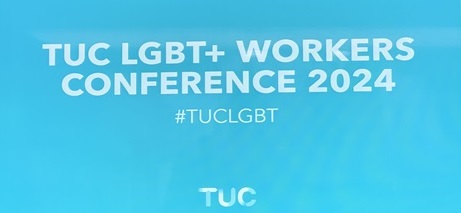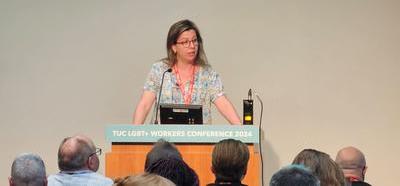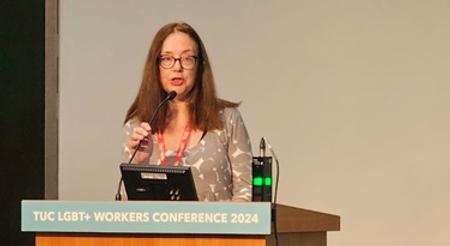TUC LGBT+ Workers Conference 2024
Closures of and cuts at the LGBT+ press and websites are depriving the community of familiar spaces for advice, belonging and advocacy.

“Many of us in this room will remember the first time we bought a copy of Gay Times, Attitude, or Diva or the Pink News,” James Doherty said, speaking to delegates at the TUC LGBT+ Workers’ Conference.
“You may well have travelled to a corner shop not on your corner, so as not to bring attention to yourself. We will all likely remember feeling that, at last, we had found our place in an often hostile media, a place where we felt we could belong.”
James, a member of the NUJ’s delegation, took colleagues back to the days when there was no internet or social media, and many people were still afraid of being outed, scarred by the HIV/AIDs backlash and media stigmatisation.
“Throughout that time,” he said, “many of us sought solace in LGBT magazines and newspapers that fought for us – and provided support and guidance on our own, sometimes difficult paths.”
He was speaking to an NUJ motion which noted the recent closures of gal-dem and The Pink Paper, plus cuts at Pink News. The publications have been hit by algorithm changes at Facebook, Google and X pivoting away from news, and the tech giants hoovering up digital advertising, which is particularly damaging to LGBTQ+ publishers whose audiences are often found on social media channels.
He said when he joined the TV series Brookside, as a scriptwriter at the age of 21, it was two years after the famous kiss between Beth and Margaret, which inevitably was criticised by the Daily, but ultimately marked the start of a boom in LGBT+ representation across TV, film and, “somewhat reluctantly”, the mainstream print media.
And now the decline of the LGBT+ press, he said, comes at time gay bars and clubs – and community spaces supported by charities and local authorities – are closing or at threat of closure. This has pushed many young people on to the toxic social media sphere, which is full of disinformation and misinformation and hatred towards minorities, and where the tech companies allow homophobic and transphobic material to flourish.
James said: “Conference, I’m glad I’m not a 10-year-old navigating my sexuality or gender identity today. But I would be glad to find a trusted, LGBT+ magazine down the back of the sofa – or on my tablet or phone screen – when I sought out information to help me navigate my life.”
The motion which called on the TUC LGBTQ+ committee to campaign for a strong, diverse LGBTQ+ media, was unanimously supported.
The NUJ delegation also included Cristina Lago, Ann Galpin and Natasha Hirst.
Support for LGBTQ+ people internationally
In his speech to conference, Lord Collins of Highbury then shadow minister for foreign affairs and international development, said: “There are still 13 countries where being gay is punishable by death and 75 where same-sex contact remains a criminal offence. We need to engage with civil society here and in our own country, most importantly, on the ground in the countries concerned. I would like to pay tribute to the role that trade unions have played here and internationally in the struggle for LGBT rights.”
A Unison motion noted that Uganda had a life imprisonment punishment for consensual same sex intimacy and a new law had created new crimes such as the “promotion of homosexuality” and introduced the death penalty for several acts considered as “aggravated homosexuality”. This attitude has fostered violence and discrimination against LGBT+ people in the country.

Cristina Lago spoke to a Chartered Society of Physiotherapy union motion amended by the NUJ which called on the TUC LGBT+ committee to work with the International Federation of Journalists to protect journalists reporting on LGBTQ+ issues “to ensure they can carry out their jobs free of threats”.
She said: “Last year in Lebanon, several political parties threatened to pass laws penalising journalists who cover issues related to LGBT+ people and feminism. The two draft laws come against the backdrop of growing repression of the LGBT+ community in Lebanon and aim to criminalise the ‘promotion of sexual deviance’ in the media.”

Ann Galpin said it could often be dangerous for LGBTQ+ workers, including journalists and their fixers, if they are sent to countries where their rights are not respected and where they could be put at risk. She said the NUJ had created a safety toolkit which provided advice for those working in hostile environments.
Fighting the far right
The threat of the far right to LGBTQ+ safety was one of the themes of conference and a composite motion spoke of the growing prevalence of hate speech on social media, the media in general and “the upsurge in hate crimes against LGBT+ people, especially those resulting from the current torrent of transphobia in political and civil life in the UK”.
Conference was told of the backlash against drag queen storytellers, especially by Republicans and the far right in the US, which had come with protests, threats of violence and wild conspiracy theories around grooming and abuse leading to a legislative push to erode LGBTQ rights in state legislatures.
Last year, a demonstration organised by the far-right group Turning Point UK, against a storytelling session by drag queen at the Honor Oak pub in south London, became violent and trans activists were injured.
Maria Exall, chair of the TUC LGBT+ council, said reactionary religious fundamental groups and the far right organising against LGBTQ+ groups were being funded by organisations based in the USA and that these extreme views were becoming mainstream.

James Doherty, Natasha Hirst, Ann Galpin & Cristina Lago
